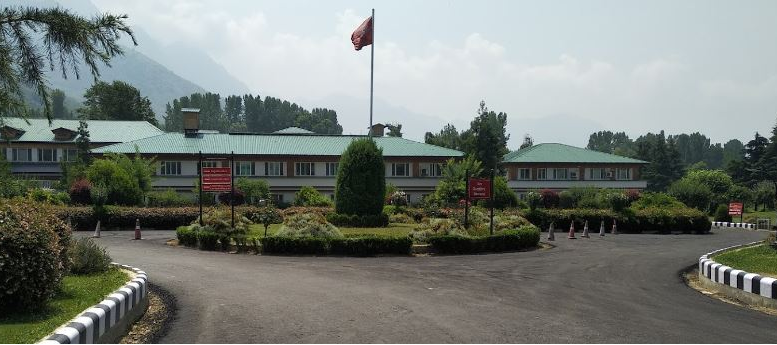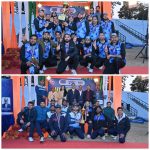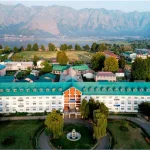The foundation of any nation is its education system, for education empowers the minds of future leaders, innovators, and citizens to shape a brighter tomorrow. A robust education system not only empowers individuals but also fuels the growth and prosperity of a nation by creating a skilled and knowledgeable workforce. In India, the National Education Policy (NEP) 2020 stands as a pivotal initiative aimed at transforming the educational landscape, making it more inclusive, accessible, and globally competitive.
With its target always on the horizon, SKUAST Kashmir again took the lead. It was the first institution to fully implement NEP’s reforms to achieve remarkable growth and transformation. The ground for a transformative system of education was laid out way back in 2017 when SKUAST-K came up with the “Institutional Development Plan” which was one of the reasons; the varsity could bag the highly competitive and massively funded ICAR National Agricultural Higher Education Project. Today, SKUAST Kashmir’s vision for agricultural education is becoming instrumental in shaping agricultural education across the nation. Through intuitive leadership and strategic initiatives, SKUAST-K has become a beacon of educational excellence in the region, setting an example for others to follow.
Expansion of Academic Offerings
SKUAST-K’s growth is also attributed to its strategic expansion of academic programs, which have doubled since 2018. The university has more than doubled its undergraduate programs, expanding from 7 courses in 2018 to 13 courses in 2024. This increase in the number of academic programs, including innovative new courses, has attracted a wider range of students. The new programs were introduced to keep pace with global trends to meet emerging educational demands. These include a B.Tech in Artificial Intelligence in Agriculture in collaboration with the prestigious IIT Mandi, B.Tech in Biotechnology, BSc (Hons) in Microbiology, BSc (Hons) in Biochemistry, BSc (Hons) in Economics and Data Science and several other PG courses like MBA. Most of these specializations are high in demand in the industry and therefore SKUAST Kashmir rose as the first university in India to start them. Students from across the country are currently enrolled in them.
The university also envisions the introduction of specialized programs like BSc Community Sciences, BTech Dairy Technology, and BSc Poultry Sciences to ensure that the university meets the changing demands of the agricultural and allied sectors. SKUAST-K’s innovative programs have gained popularity due to their practical relevance and unique structure. Courses like these, which blend traditional agricultural knowledge with modern technologies, are designed to prepare students for a dynamic job market. These unique offerings attract a wide range of students who want to explore interdisciplinary fields, meeting NEP’s emphasis on skills-oriented learning.
Flexible and Multidisciplinary Curricula
To align with NEP’s emphasis on flexibility and multidisciplinary learning, SKUAST-K has developed a wide array of programs that merge traditional agricultural knowledge with emerging fields. Courses such as BTech in Artificial Intelligence (AI) in Agriculture, BSc in Economics & Data Science, and MSc in Wildlife Science offer students diverse academic pathways, catering to both local and international student populations. Additionally, SKUAST-K has introduced innovative degree structures, such as UG degrees by design, dual degrees, and sandwich-mode PG programs, providing students with greater control over their educational journey. These flexible learning options are central to SKUAST-K’s vision of making education more accessible and adaptable to the evolving needs of students. By embracing these reforms, the university not only aligns with NEP’s broader objective of fostering an inclusive and flexible education system but also ensures that its graduates are equipped with both comprehensive theoretical knowledge and essential practical skills, preparing them for success in an ever-changing workforce.
Increased Intake Capacity and Infrastructure Development
Responding to increased demand for higher education, SKUAST-K has expanded its intake capacity. Infrastructure upgrades, including state-of-the-art laboratories, smart classrooms, and digital learning spaces, have supported this growth, allowing the university to provide quality education to a larger number of students. This proactive expansion directly addresses NEP’s focus on improving access to higher education.
Internationalization and Global Collaboration
SKUAST-K has made significant strides in internationalizing its programs, attracting students from across India and abroad. Starting with the groundbreaking and pioneering International Education Fair in 2022, the university established exchange programs, formed partnerships with international institutions and offered globally recognized courses. The university has created an inclusive environment that fosters cross-cultural learning. This international outreach aligns with NEP 2020’s vision to position India as a global educational hub.
Enhanced Ranking and Reputation
As SKUAST-K has improved its academic standards and rankings, it has gained national recognition. This reputation has attracted students from all Indian states, who see SKUAST-K as a leader in agricultural sciences and allied disciplines. Better rankings, coupled with a strong emphasis on research and innovation, further enhance the university’s appeal, driving enrollment and cementing its status as a top institution in the region.
Diverse and Inclusive Student Body
SKUAST-K’s diverse curriculum has attracted students from a range of backgrounds, promoting inclusivity and cultural exchange. The university has seen an increase in enrollment from all across India and internationally, with students filling paid seats, NRI seats, and other slots. This diversity enriches the learning experience and aligns with NEP’s vision of making higher education accessible and globally connected.
Focus on Skill Development and Industry Collaboration
A critical aspect of SKUAST-K’s success is its emphasis on skill development and practical experience. The university has integrated industry collaboration within its curriculum, allowing students to gain hands-on experience through internships and training programs. This focus on skill-based learning aligns with NEP’s goal of bridging the gap between academia and industry, ensuring that SKUAST-K graduates are job-ready and equipped with practical competencies.
Moreover, SKUAST-K has positioned itself as a leader in innovation, a core mandate that now stands as the fourth pillar of its mission. The university has consistently demonstrated excellence in research and development, securing 22 patents in a single year—an impressive feat that underscores its commitment to fostering a culture of innovation. Additionally, SKUAST-K boasts a growing ecosystem of student and faculty-led startups, some of which are already showing early signs of becoming unicorns. These ventures not only contribute to the local economy but also create an environment where entrepreneurship and innovation thrive, further enhancing the university’s impact on both the academic and professional landscapes. By embedding innovation into its core values, SKUAST-K ensures that its students and faculty are not only consumers of knowledge but also creators, driving progress in agriculture, technology, and allied sectors.
A Model for Educational Transformation
SKUAST-K has transformed into a leading institution for agricultural sciences and allied fields. By embracing the NEP’s ideals of flexibility, inclusivity, and skill-based education, SKUAST-K has not only expanded its enrollment but also set a standard for educational innovation in Jammu and Kashmir. Its success serves as a blueprint for other universities in the region, illustrating that with strategic planning and a commitment to excellence, educational institutions can achieve sustained growth and impact.
SKUAST-K’s transformation underscores the power of NEP-driven reforms when implemented thoughtfully, demonstrating that quality education, global engagement, and an adaptable curriculum can drive both regional and national progress.
(Prof Azmat Alam Khan is Associate Director of Research and DR Ambreen Hamdani is Assistant Professor at SKUAST-K)








